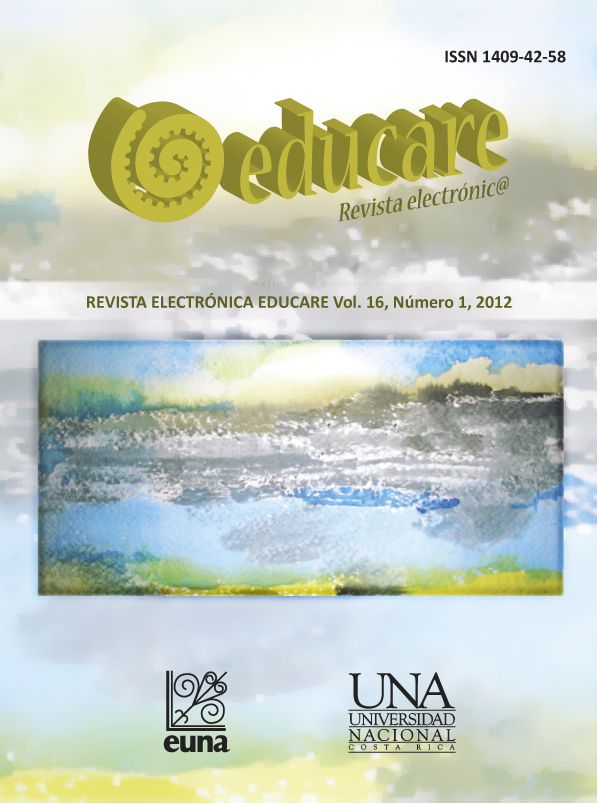Andragogy as a Knowledge Driving Discipline in Higher Education
DOI:
https://doi.org/10.15359/ree.16-1.2Keywords:
Andragogy, higher education, adult, cognitive competence, meta-cognitive competence, university professorAbstract
This paper exposes the diachronic (historical overview) of Andragogy (or Adult Education) and its introduction as a discipline in the context of university education. Based on the andragogical principles of the adult thought process and the work experience, this study sets out Adult Education as an education option to be implemented in higher education, in Costa Rica, to develop cognitive and meta-cognitive competencies in the university students, in the different academic areas simultaneously, by reproducing the Socratic maieutics, which is structured within the Kolb’s experiential learning cycle.References
Adam, F. (1984). Universidad y educación de adultos. En Siete visiones de la educación de adultos (pp. 86-93). Pátzcuaro, México: CREFAL. Recuperado de http://www.crefal.edu.mx/
crefal2012/images/stories/publicaciones/retablos_papel/retablo_papel1.pdf
Álvarez, A. (1977). Análisis crítico de la Andragogía en base a las ideas de Knowles, Adam y Savicevic. (Tesis doctoral). Universidad Nacional Experimental Simón Rodríguez. Caracas,
Venezuela. Recuperado de http://postgrado.una.edu.ve/andragogia/paginas/alvarez1977.pdf
Banchio, L. (10 de febrero del 2004). La educación según Platón. [weblog post]. Recuperado de http://www.luventicus.org/articulos/04D001/index.html
Cazau, P. (11 de agosto del 2003). ¿Qué es la Andragogía? [web logpost]. Recuperado de http:// articulosdeyca.blogspot.com/2009/03/que-es-andragogia.html
Fingermann, H. (9 de marzo del 2011). Sócrates y la Educación [weblog post]. Recuperado de
http://educacion.laguia2000.com/general/socrates-y-la-educacion
Gómez, J. (s. f.). El aprendizaje experiencial. [Cód. 693, curso Capacitación y desarrollo en las organizaciones, Facultad de Psicología, Universidad de Buenos Aires]. Buenos
Aires, Argentina. Recuperado de http://www.ecominga.uqam.ca/ECOMINGA_2011/PDF/
BIBLIOGRAPHIE/GUIDE_LECTURE_5/1/3.Gomez_Pawelek.pdf
Hernández, P. (s. f.). El pensamiento educativo de Aristóteles. Recuperado de http://scarball. awardspace.com/documentos/trabajos-defilosofia/Aristoteles.pdf
Instituto Nacional para la Educación de Adultos (INEA). (2007). Andragogía (Lectura 1, Año 9). México, D. F. Recuperado de http://tecnoeduka.110mb.com/documentos/teoria%20
aprendizaje/Andragogia%202.pdf
Jackson, R. (11 de noviembre de 2004). Redacción: Educación en Platón [weblog post] Recuperado
de http://dolphin.blogia.com/2004/111102-redaccion-educacion-en-platon.php
Lépiz, C. (2011). Perspectiva de la docencia universitaria [Presentación Power point]. Heredia: Universidad Nacional.
Mijangos, R. (s. f.). Juan Federico Herbart: Propuesta pedagógica. Recuperado de http://scarball.awardspace.com/documentos/trabajos-de-filosofia/Herbart.pdf
Pascual-CastroViejo, I. (1996). Plasticidad cerebral. Rev Neurol, 24(135), 1361-1366. Recuperado de http://www.psicomag.com/biblioteca/1996/Plasticidad%20Cerebral.pdf
Rivera, A. (1998). Arqueología del lenguaje en el proceso evolutivo del género homo. espacio, tiempo y forma, Serie I, Prehistoria y Arqueología, 11, 13-43. Recuperado de http://
e-spacio.uned.es/fez/eserv.php?pid=bibliuned:ETFSerie1-E9059635-79A4-9C64-E22AB9146E7D8EDC&dsID=PDF
Sánchez, P. A. (1989). Hacia una estrategia peda-andragógica que incremente la participación del estudiante en el aprendizaje de la Matemática (un enfoque antinómico). (Tesis de Maestría).
Universidad Nacional Experimental de los Llanos Occidentes Ezequiel Zamora (UNELLEZ), Barinas, Venezuela. Recuperado de http://servidor-opsu.tach.ula.ve/ascen_acro/sanc_al/cont/
presentacion.pdf
Sanz, M. L. (2010). Competencias cognitivas en Educación Superior. Madrid: Narcea.
Tarrio, J. A. (s. f.). La educabilidad. Recuperado de http://webs.uvigo.es/jtarrio/OBRALITERARIA/LA EDUCABILIDAD.pdf
Downloads
Additional Files
Published
How to Cite
Issue
Section
License
1. In case the submitted paper is accepted for publication, the author(s) FREELY, COSTLESS, EXCLUSIVELY AND FOR AN INDEFINITE TERM transfer copyrights and patrimonial rights to Universidad Nacional (UNA, Costa Rica). For more details check the Originality Statement and Copyright Transfer Agreement
2. REUTILIZATION RIGHTS: UNA authorizes authors to use, for any purpose (among them selfarchiving or autoarchiving) and to publish in the Internet in any electronic site, the paper´'s final version, both approved and published (post print), as long as it is done with a non commercial purpose, does not generate derivates without previous consentment and recognizes both publisher's name and authorship.
3. The submission and possible publication of the paper in the Educare Electronic Journal is ruled by the Journal’s editorial policies, the institutional rules of Universidad Nacional and the laws of the Republic of Costa Rica. Additionally, any possible difference of opinion or future dispute shall be settled in accordance with the mechanisms of Alternative Dispute Resolution and the Costa Rican Jurisdiction.
4. In all cases, it is understood that the opinions issued are those of the authors and do not necessarily reflect the position and opinion of Educare, CIDE or Universidad Nacional, Costa Rica. It is also understood that, in the exercise of academic freedom, the authors have carried out a rogorous scientific-academic process of research, reflection and argumentation thar lays within the thematic scope of interest of the Journal.
5. The papers published by Educare Electronic Journal use a Creative Commons License:















 The articles published by Educare Electronic Journal can be shared with a Creative Commons License:
The articles published by Educare Electronic Journal can be shared with a Creative Commons License: 



